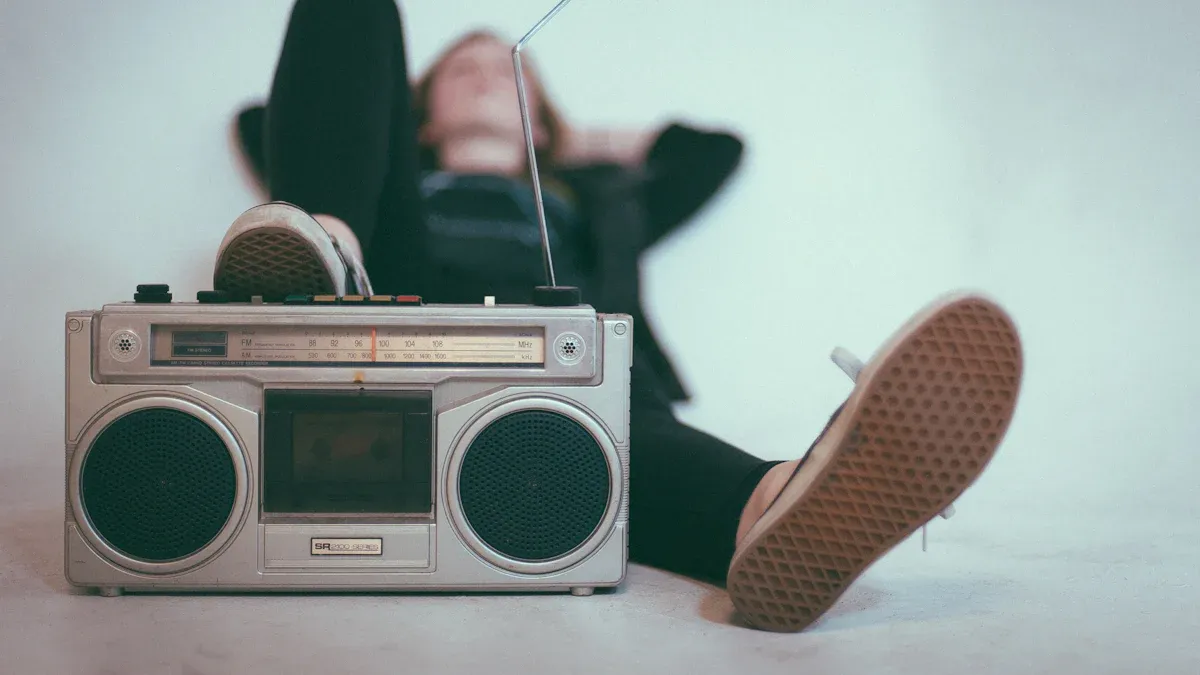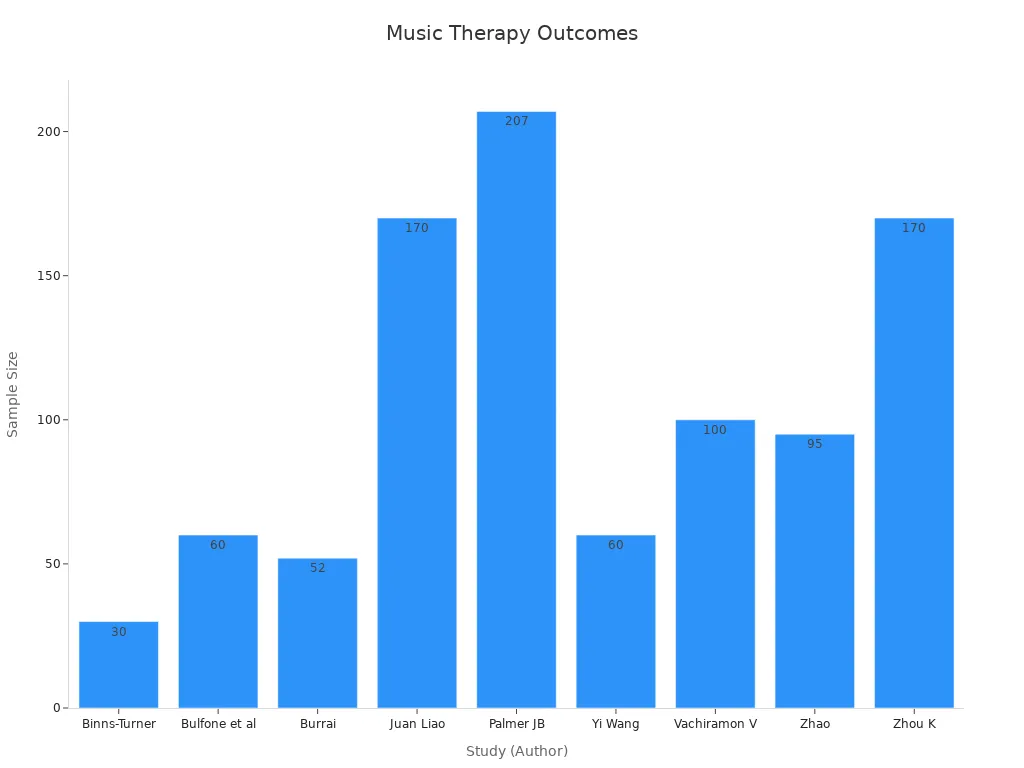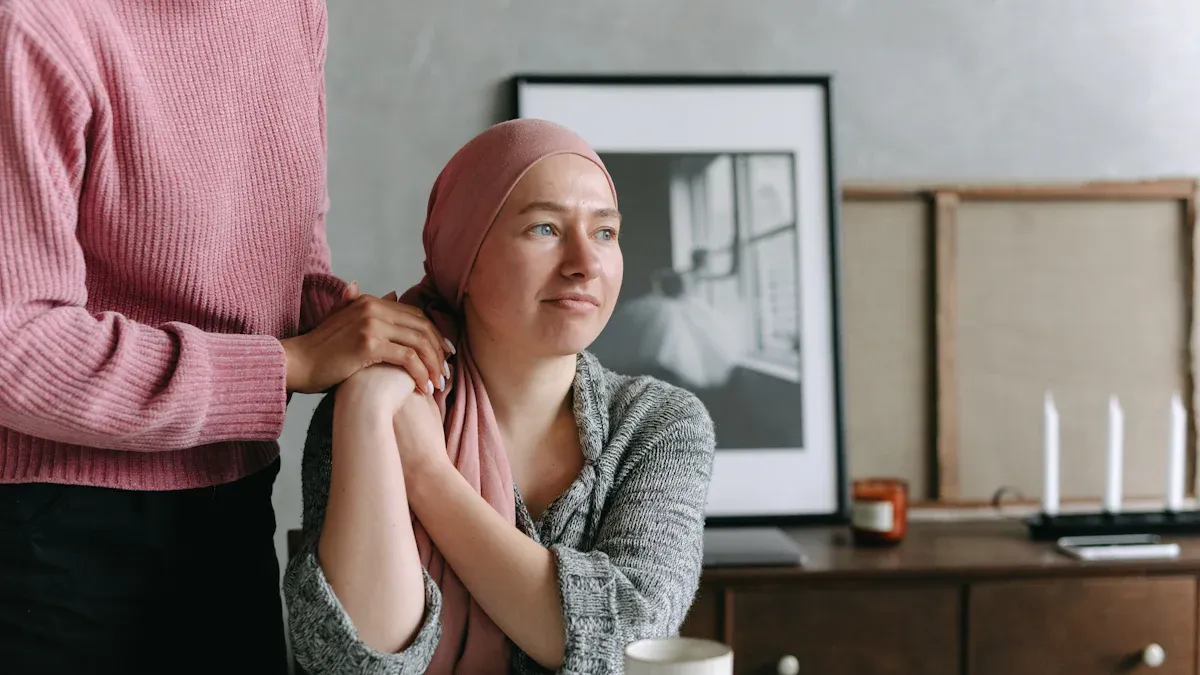How Music Therapy Supports Cancer Recovery Physically and Emotionally

Music therapy supports your cancer recovery by improving both physical and emotional well-being. You can experience less anxiety, better sleep, and improved mood when music therapy becomes part of your care. Studies show that people who receive music therapy along with conventional treatment often report better sleep quality and lower distress scores than those who do not. The Therapeutic Role of Music in Cancer Recovery includes reducing pain, easing fatigue, and helping you relax. Music therapy is safe, evidence-based, and tailored to your unique needs, offering comfort and hope during challenging times.
Key Takeaways
Music therapy helps reduce pain, anxiety, and fatigue during cancer treatment, improving your physical comfort.
It supports emotional well-being by lifting your mood, easing stress, and giving you ways to express your feelings.
Working with a certified music therapist offers personalized care that fits your needs and helps you stay engaged.
You can also use music on your own to relax and feel calmer whenever you need support.
Music therapy is safe, easy to use with other treatments, and can boost your overall quality of life during recovery.
What Is Music Therapy?
Definition
Music therapy is a clinical practice where trained professionals use music to help you reach specific health goals. You work with a certified music therapist who understands how music affects your body and mind. This therapy is not just about listening to music. You might sing, play instruments, write songs, or move to music during your sessions.
Music therapy stands out as a regulated, evidence-based practice. Accredited therapists use proven musical techniques that fit your treatment plan. This approach is different from simply listening to music or joining a music group. Your therapist creates a plan that matches your age, culture, and health needs. You receive care that supports your emotional, social, spiritual, and physical well-being.
Music therapy has become a core service in many healthcare settings. In hospice and palliative care, music therapists work closely with nurses, doctors, social workers, and chaplains. This teamwork helps you get care that looks at your whole self, not just your illness. You benefit from a plan that brings together many experts to support you in every way.
How It Works
You take an active role in music therapy. Your therapist might ask you to choose songs that mean something to you. You could play simple instruments or create your own music. Sometimes, you listen to music that helps you relax or express your feelings.
Music therapy uses several methods:
Singing or vocalizing
Playing instruments
Writing or composing songs
Moving or dancing to music
Guided music listening
Your therapist adjusts each session to fit your needs. If you feel anxious, music can help you calm down. If you have pain, certain rhythms or melodies may distract you and make you feel better. Music therapy also helps you connect with others and share your feelings in a safe space.
Music therapy works best when therapists, doctors, and other specialists work together. This team approach gives you the best chance to heal both physically and emotionally.
The Therapeutic Role of Music in Cancer Recovery
Music can play a powerful part in your healing journey. The Therapeutic Role of Music in Cancer Recovery goes beyond just listening to songs. You can use music to manage pain, reduce anxiety, and improve your quality of life. Many hospitals and cancer centers now offer music therapy as a regular part of care. You do not use music therapy to cure cancer, but you can use it to feel better during treatment and recovery.
Physical Support
The Therapeutic Role of Music in Cancer Recovery includes helping your body cope with the side effects of treatment. You may feel pain, nausea, or fatigue during cancer care. Music therapy can help you manage these symptoms. Studies show that both active music therapy (like singing or playing instruments) and passive music therapy (like listening to music) can make a difference.
Music therapy can reduce pain, nausea, and fatigue.
You may feel more relaxed and less stressed after a session.
Active music therapy often leads to greater reductions in cancer-related fatigue.
You can use music therapy alongside treatments like chemotherapy or radiation.
A study with 43 cancer patients in palliative care showed that after 102 music therapy sessions, most patients felt less pain and anxiety. The sessions lasted about 30 minutes, and 85% of patients stayed engaged throughout. The table below shows some of the results:
Evidence Aspect | Details |
|---|---|
Number of Sessions | 102 individual music therapy sessions |
Average Sessions per Patient | 2–4 sessions |
Pain and Anxiety Reduction | Statistically significant decrease (P < 0.01) |
Mood Improvement | Significant improvement (P < 0.01) |
Motivation Enhancement | Significant increase (P < 0.01) |
Engagement Levels | Good in 85% of sessions |
You can see that The Therapeutic Role of Music in Cancer Recovery supports your physical health in many ways. Music therapy uses live or recorded music, relaxation techniques, and movement to help you feel better. You may notice less pain and more energy after a session. Many patients also report feeling more in control and satisfied with their care.
Note: Music therapy is a nonpharmacologic option. You can use it safely with other treatments, and it does not cause harmful side effects.
Emotional Support
The Therapeutic Role of Music in Cancer Recovery also supports your emotional well-being. Cancer can bring feelings of anxiety, sadness, and stress. Music therapy gives you a way to express your feelings and find comfort. You may listen to calming music, write songs, or play instruments to share your emotions.
Many studies show that music therapy helps reduce anxiety and improve mood. In one meta-analysis, music therapy sessions lasting 15 to 60 minutes led to moderate reductions in anxiety for cancer patients. Most patients felt less worried and more hopeful after music therapy. The table below highlights some emotional outcomes from different studies:
Study (Author) | Sample Size | Cancer Type | Emotional Outcome |
|---|---|---|---|
Binns-Turner | 30 | Breast | Significant anxiety reduction vs control |
Bulfone et al | 60 | Breast | Significant anxiety difference between groups |
Burrai | 52 | Various | Live music improved mood and oxygen saturation |
Juan Liao | 170 | Various | Improved quality of life and performance score |
Palmer JB | 207 | Breast | Managed preoperative anxiety effectively |
Yi Wang | 60 | Lung | Reduced anxiety and stress, improved analgesia |
Vachiramon V | 100 | Skin | Anxiety reduction observed |
Zhao | 95 | Various | Significantly less anxiety post-intervention |
Zhou K | 170 | Breast | Reduced depression, anxiety, and hospital stay |

You may notice that The Therapeutic Role of Music in Cancer Recovery helps you feel calmer and more positive. In one study, music therapy sessions helped patients feel less anxious and sad during each session. Even when patients faced challenges, music therapy still brought emotional relief. You can use music therapy to cope with stress, share your feelings, and build hope for the future.
Music therapy reduces anxiety and sadness.
You can improve your mood and feel more motivated.
Music therapy helps you cope with the emotional ups and downs of cancer.
The Therapeutic Role of Music in Cancer Recovery is clear. You can use music therapy to manage both physical and emotional symptoms. You gain comfort, hope, and a sense of control during your cancer journey.
Physical Benefits

Pain Relief
You may notice that pain is a common challenge during cancer treatment. Music therapy can help you manage pain in a safe and gentle way. Clinical trials show that music therapy often reduces pain more than medicine alone. Sessions that last about 20 minutes seem to work best. Here are some key findings:
Music therapy sessions can lower pain scores by about 1 to 1.4 points on a standard pain scale.
One study found a significant drop in pain after just 20 minutes of music therapy.
Another trial showed a mean decrease of 1.4 points in pain scores for people who received music therapy compared to those who did not.
You can use music therapy along with your regular pain medicine. This approach gives you extra comfort without extra side effects.
Symptom Management
Cancer and its treatments can cause many symptoms, such as fatigue, anxiety, and changes in mood. Music therapy helps you manage these symptoms and feel better overall. Many studies support its effectiveness. The table below shows some important results:
Outcome/Aspect | Source | Key Findings |
|---|---|---|
Cancer-related pain | Yangöz & Özer (2019) | Significant pain reduction with music interventions |
Fatigue in blood cancers | Sezgin & Bektas (2022) | Music therapy reduces fatigue |
Anxiety, depression, quality of life | Nguyen et al. (2022) | Reduces anxiety and depression, improves quality of life |
Psychological & physical outcomes | Bradt et al. (2021) | Improves both psychological and physical outcomes |
Safety | Overview (2023) | No adverse effects reported |
You can see that music therapy supports your body and mind. It is safe and may even save costs in your care.
Relaxation
Music therapy also helps you relax during stressful times. You might listen to calming music, write songs, or use guided imagery. These activities lower your heart rate and blood pressure. You may feel less anxious and more at peace. Studies show that music therapy:
Reduces anxiety and distress during chemotherapy, surgery, and radiation.
Improves relaxation, comfort, and mood.
Helps you find hope and express your feelings.
You can use music therapy to create a peaceful space for yourself. Many people say they feel calmer and more comfortable after each session.
Emotional Benefits

Anxiety Reduction
You may feel anxious during cancer treatment. Music therapy can help you manage this anxiety. Many studies show that music therapy leads to real, measurable drops in anxiety levels for people with cancer. For example, a Cochrane Review looked at over 5,500 participants and found a large effect size for anxiety reduction. Other reviews also found moderate to large reductions in anxiety. The table below shows some of these results:
Study / Review | Number of Participants | Effect on Anxiety | Additional Notes |
|---|---|---|---|
Cochrane Review (Bradt et al., 2021) | 5,576 | Large effect size for anxiety reduction | Improved quality of life |
Systematic Reviews & Meta-analyses | Various | Moderate to large reductions | Psychological and physiological benefits |
End-of-life care meta-analysis | N/A | Significant reduction | Improved quality of life, less pain and depression |
You might notice your anxiety drop after just one session. In one study, patients who listened to music before radiation therapy had lower anxiety scores than those who rested without music. Music therapy can help you feel calmer and more in control.
Mood Improvement
Music therapy can lift your mood during tough times. You may feel happier and more hopeful after a session. Research shows that patients who receive music therapy report more enjoyment and gratitude. In a study at a cancer center, people said their mood improved and they felt less anxious after music therapy.
Patients listening to music during chemotherapy felt more positive and less distressed.
Mood improvements were linked to music therapy, not to other factors like cancer stage or musical training.
The therapy was safe, low-cost, and easy to use.
Music therapy gives you a safe way to feel better emotionally, even when you face hard days.
Coping and Expression
Cancer can bring many emotions. Music therapy helps you cope and express your feelings. You might sing, play instruments, or write songs. These activities let you share your thoughts and connect with others. Some patients use favorite songs to find hope or calm during treatment. Others use music to remember good times or to feel strong.
Music therapy gives you tools to manage stress and express yourself. Group drumming or songwriting can help you process feelings and build social bonds. Listening to calming music can help you relax and heal emotionally. You gain new ways to cope and feel understood during your cancer journey.
Accessing Music Therapy
Working with Professionals
You can work with a certified music therapist to get the most out of music therapy. These professionals know how to use music to help you feel better during cancer recovery. You might join sessions in a hospital, cancer center, or clinic. Your therapist will ask about your needs and help you choose between active and passive music therapy.
Active music therapy lets you sing, play instruments, or create music. This approach feels stimulating and interactive. You get to connect with others and feel more engaged.
Passive music therapy involves listening to music. You may find this calming and relaxing. It helps you focus, reflect, and ease your anxiety.
You can choose the type of session that fits you best. Having a choice gives you a sense of control during treatment.
Many patients say music therapy changes their hospital experience. You may feel more positive and comfortable. Music therapy can help you manage symptoms and improve your well-being.
Tip: Ask your care team if music therapy is available at your treatment center. A professional can guide you and adjust sessions to your needs.
Self-Guided Options
You can also use music on your own to support your recovery. Research shows that both self-guided music listening and professional therapy help people with cancer. In one study, patients who worked with a therapist felt more social and engaged. Those who listened to music on their own felt calm and less anxious.
Active, therapist-led sessions offer social interaction and help you feel connected.
Self-guided listening brings calm and helps you relax.
Both options help you cope with cancer in different ways.
You can choose what works best for you. Your preferences matter and can shape your experience.
You might listen to your favorite songs, create playlists, or try guided music apps. You can use music at home, during treatment, or whenever you need comfort. Music therapy, whether professional or self-guided, gives you tools to manage stress and feel better every day.
Music therapy gives you real support during cancer recovery. You can feel less pain and sadness, and your quality of life can improve. Studies show that music therapy lowers depression and boosts your ability to cope. The table below highlights these benefits:
Outcome Measure | Description | Impact |
|---|---|---|
SDS | Lower depression scores | Emotional benefit |
FACT-B | Better quality of life | Physical and emotional benefit |
Safety | Safe, non-drug option | Supports clinical use |
You may notice more resilience and less pain after sessions.
Many people find music therapy easy to use with other treatments.
Try music therapy with a professional or on your own to support your recovery.
FAQ
What types of music work best for cancer recovery?
You can choose any music that helps you feel calm or happy. Many people like soft, slow songs. Some prefer upbeat tunes. Your music therapist can help you find the best style for you.
Can you do music therapy at home?
Yes! You can listen to your favorite songs, sing, or play simple instruments at home. Try making playlists for different moods. A music therapist can also give you tips for home sessions.
Is music therapy safe for everyone?
Music therapy is safe for most people. You should tell your therapist about your health and any strong feelings certain songs bring up. Your therapist will adjust the sessions to fit your needs.
How often should you have music therapy sessions?
You might start with one or two sessions each week. Some people enjoy more frequent sessions. Your therapist will help you decide what works best for your recovery and comfort.
See Also
Recognizing Symptoms And Treatment Options For Conjunctival Melanoma
A Comprehensive Guide To Symptoms And Treatment Of Duodenal Cancer
Identifying Common Symptoms Of Breast Cancer In Men
Understanding Inflammatory Breast Cancer And Its Key Symptoms

